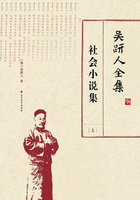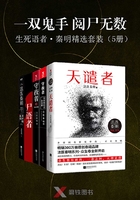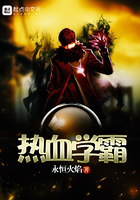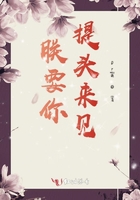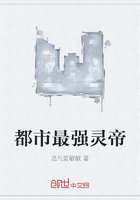“So she was very sad, very miserable, and furrowed her cheeks with tears.But in the midst of her shame, her folly, her debauchery, it seemed to her that she should be less wild, less shameful, less dissipated, if there were something or some one in the world whom she could love, and who could love her.It was necessary that it should be a child, because only a child could be sufficiently innocent for that.She had recognized this fact after having tried to love a thief, the only man who wanted her; but after a short time, she perceived that the thief despised her.Those women of love require either a lover or a child to fill their hearts.Otherwise, they are very unhappy.As she could not have a lover, she turned wholly towards a desire for a child, and as she had not ceased to be pious, she made her constant prayer to the good God for it.So the good God took pity on her, and gave her a little daughter.I will not speak to you of her joy; it was a fury of tears, and caresses, and kisses.She nursed her child herself, made swaddling-bands for it out of her coverlet, the only one which she had on her bed, and no longer felt either cold or hunger.She became beautiful once more, in consecondTitle of it.An old maid makes a young mother.Gallantry claimed her once more; men came to see la Chantefleurie; she found customers again for her merchandise, and out of all these horrors she made baby clothes, caps and bibs, bodices with shoulder-straps of lace, and tiny bonnets of satin, without even thinking of buying herself another coverlet.—Master Eustache, I have already told you not to eat that cake.—It is certain that little Agnès, that was the child's name, a baptismal name, for it was a long time since la Chantefleurie had had any surname—it is certain that that little one was more swathed in ribbons and embroideries than a dauphiness of Dauphiny!Among other things, she had a pair of little shoes, the like of which King Louis XI.certainly never had!Her mother had stitched and embroidered them herself; she had lavished on them all the delicacies of her art of embroideress, and all the embellishments of a robe for the good Virgin.They certainly were the two prettiest little pink shoes that could be seen.They were no longer than my thumb, and one had to see the child's little feet come out of them, in order to believe that they had been able to get into them.'Tis true that those little feet were so small, so pretty, so rosy!rosier than the satin of the shoes!When you have children, Oudarde, you will find that there is nothing prettier than those little hands and feet.”
“I ask no better, ”said Oudarde with a sigh, “but I am waiting until it shall suit the good pleasure of M. Andry Mushier.”
“However, Paquette's child had more that was pretty about it besides its feet. I saw her when she was only four months old; she was a love!She had eyes larger than her mouth, and the most charming black hair, which already curled.She would have been a magnificent brunette at the age of sixteen!Her mother became more crazy over her every day.She kissed her, caressed her, tickled her, washed her, decked her out, devoured her!She lost her head over her, she thanked God for her.Her pretty, little rosy feet above all were an endless source of wonderment, they were a delirium of joy!She was always pressing her lips to them, and she could never recover from her amazement at their smallness.She put them into the tiny shoes, took them out, admired them, marvelled at them, looked at the light through them, was curious to see them try to walk on her bed, and would gladly have passed her life on her knees, putting on and taking off the shoes from those feet, as though they had been those of an Infant Jesus.”
“The tale is fair and good, ”said Gervaise in a low tone; “but where do gypsies come into all that?”
“Here, ”replied Mahiette.“One day there arrived in Reims a very queer sort of people.They were beggars and vagabonds who were roaming over the country, led by their duke and their counts.They were browned by exposure to the sun, they had closely curling hair, and silver rings in their ears.The women were still uglier than the men.They had blacker faces, which were always uncovered, a miserable frock on their bodies, an old cloth woven of cords bound upon their shoulder, and their hair hanging like the tail of a horse.The children who scrambled between their legs would have frightened as many monkeys.A band of excommunicates.All these persons came direct from lower Egypt to Reims through Poland.The Pope had confessed them, it was said, and had prescribed to them as penance to roam through the world for seven years, without sleeping in a bed; and so they were called penancers, and smelt horribly.It appears that they had formerly been Saracens, which was why they believed in Jupiter, and claimed ten livres of Tournay from all archbishops, bishops, and mitred abbots with croziers.A bull from the Pope empowered them to do that.They came to Reims to tell fortunes in the name of the King of Algiers, and the Emperor of Germany.You can readily imagine that no more was needed to cause the entrance to the town to be forbidden them.Then the whole band camped with good grace outside the gate of Braine, on that hill where stands a mill, beside the cavities of the ancient chalk pits.And everybody in Reims vied with his neighbor in going to see them.They looked at your hand, and told you marvellous prophecies; they were equal to predicting to Judas that he would become Pope.Nevertheless, ugly rumors were in circulation in regard to them; about children stolen, purses cut, and human flesh devoured.The wise people said to the foolish:“Don't go there!”and then went themselves on the sly.It was an infatuation.The fact is, that they said things fit to astonish a cardinal.Mothers triumphed greatly over their little ones after the Egyptians had read in their hands all sorts of marvels written in pagan and in Turkish.One had an emperor; another, a pope; another, a captain.Poor Chantefleurie was seized with curiosity; she wished to know about herself, and whether her pretty little Agnès would not become some day Empress of Armenia, or something else. So she carried her to the Egyptians; and the Egyptian women fell to admiring the child, and to caressing it, and to kissing it with their black mouths, and to marvelling over its little band, alas!to the great joy of the mother.They were especially enthusiastic over her pretty feet and shoes.The child was not yet a year old.She already lisped a little, laughed at her mother like a little mad thing, was plump and quite round, and possessed a thousand charming little gestures of the angels of paradise.
She was very much frightened by the Egyptians, and wept.But her mother kissed her more warmly and went away enchanted with the good fortune which the soothsayers had foretold for her Agnès.She was to be a beauty, virtuous, a queen.So she returned to her attic in the Rue Folle-Peine, very proud of bearing with her a queen.The next day she took advantage of a moment when the child was asleep on her bed, gently left the door a little way open, and ran to tell a neighbor in the Rue de la Séchesserie, that the day would come when her daughter Agnès would be served at table by the King of England and the Archduke of Ethiopia, and a hundred other marvels.On her return, hearing no cries on the staircase, she said to herself:“Good!the child is still asleep!”She found her door wider open than she had left it, but she entered, poor mother, and ran to the bed.—The child was no longer there, the place was empty.Nothing remained of the child, but one of her pretty little shoes.She flew out of the room, dashed down the stairs, and began to beat her head against the wall, crying:“My child!who has my child?Who has taken my child?”The street was deserted, the house isolated; no one could tell her anything about it.She went about the town, searched all the streets, ran hither and thither the whole day long, wild, beside herself, terrible, snuffing at doors and windows like a wild beast which has lost its young.She was breathless, dishevelled, frightful to see, and there was a fire in her eyes which dried her tears.She stopped the passers-by and cried:“My daughter!my daughter!my pretty little daughter!If any one will give me back my daughter, I will he his servant, the servant of his dog, and he shall eat my heart if he will.”She met M.le Cur?of Saint-Remy, and said to him:“Monsieur, I will till the earth with my finger-nails, but give me back my child!”It was heartrending, Oudarde; and IL saw a very hard man, Master Ponce Lacabre, the procurator, weep.Ah!poor mother!In the evening she returned home.During her absence, a neighbor had seen two gypsies ascend up to it with a bundle in their arms, then descend again, after closing the door.After their departure, something like the cries of a child were heard in Paquette's room.The mother, burst into shrieks of laughter, ascended the stairs as though on wings, and entered.—A frightful thing to tell, Oudarde!Instead of her pretty little Agnès, so rosy and so fresh, who was a gift of the good God, a sort of hideous little monster, lame, one-eyed, deformed, was crawling and squalling over the floor.She hid her eyes in horror.“Oh!”said she, “have the witches transformed my daughter into this horrible animal?”They hastened to carry away the little club-foot; he would have driven her mad.It was the monstrous child of some gypsy woman, who had given herself to the devil.He appeared to be about four years old, and talked a language which was no human tongue; there were words in it which were impossible.La Chantefleurie flung herself upon the little shoe, all that remained to her of all that she loved.She remained so long motionless over it, mute, and without breath, that they thought she was dead.Suddenly she trembled all over, covered her relic with furious kisses, and burst out sobbing as though her heart were broken.I assure you that we were all weeping also.She said:“Oh, my little daughter!my pretty little daughter!where art thou?”—and it wrung your very heart.I weep still when I think of it.Our children are the marrow of our bones, you see.—My poor Eustache!thou art so fair!—If you only knew how nice he is!yesterday he said to me:“I want to be a gendarme, that I do.”Oh!my Eustache!if I were to lose thee!—All at once la Chantefleurie rose, and set out to run through Reims, screaming:“To the gypsies' camp!to the gypsies' camp!Police, to burn the witches!”The gypsies were gone.It was pitch dark.They could not be followed.On the morrow, two leagues from Reims, on a heath between Gueux and Tilloy, the remains of a large fire were found, some ribbons which had belonged to Paquette's child, drops of blood, and the dung of a ram.The night just past had been a Saturday.There was no longer any doubt that the Egyptians had held their Sabbath on that heath, and that they had devoured the child in company with Beelzebub, as the practice is among the Mahometans.When La Chantefleurie learned these horrible things, she did not weep, she moved her lips as though to speak, but could not.On the morrow, her hair was gray.On the second day, she had disappeared.
“'Tis in truth, a frightful tale, ”said Oudarde, “and one which would make even a Burgundian weep.”
“I am no longer surprised, ”added Gervaise, “that fear of the gypsies should spur you on so sharply.”
“And you did all the better, ”resumed Oudarde, “to flee with your Eustache just now, since these also are gypsies from Poland.”
“No, ”said Gervais, “'tis said that they come from Spain and Catalonia.”
“Catalonia? 'tis possible, ”replied Oudarde.“Pologne, Catalogue, Valogne, I always confound those three provinces, One thing is certain, that they are gypsies.”
“Who certainly, ”added Gervaise, “have teeth long enough to eat little children. I should not be surprised if la Esmer alda ate a little of them also, though she pretends to be dainty.Her white goat knows tricks that are too malicious for there not to be some impiety underneath it all.”
Mahiette walked on in silence. She was absorbed in that revery which is, in some sort, the continuation of a mournful tale, and which ends only after having communicated the emotion, from vibration to vibration, even to the very last fibres of the heart.Nevertheless, Gervaise addressed her, “And did they ever learn what became of la Chantefleurie?”Mahiette made no reply.Gervaise repeated her question, and shook her arm, calling her by name.Mahiette appeared to awaken from her thoughts.
“What became of la Chantefleurie?”she said, repeating mechanically the words whose impression was still fresh in her ear; then, ma king an effort to recall her attention to the meaning of her words, “Ah!”she continued briskly, “no one ever found out.”
She added, after a pause, —
“Some said that she had been seen to quit Reims at nightfall by the Fléchembault gate; others, at daybreak, by the old Basée gate.A poor man found her gold cross hanging on the stone cross in the field where the fair is held.It was that ornament which had wrought her ruin, in' 61.It was a gift from the handsome Vicomte de Cormontreuil, her first lover.Paquette had never been willing to part with it, wretched as she had been.She had clung to it as to life itself. So, when we saw that cross abandoned, we all thought that she was dead.Nevertheless, there were people of the Cabaret les Vantes, who said that they had seen her pass along the road to Paris, walking on the pebbles with her bare feet.But, in that case, she must have gone out through the Porte de Vesle, and all this does not agree.Or, to speak more truly, I believe that she actually did depart by the Porte de Vesle, but departed from this world.”
“I do not understand you, ”said Gervaise.
“La Vesle, ”replied Mahiette, with a melancholy smile, “is the river.”
“Poor Chantefleurie!”said Oudarde, with a shiver, —”drowned!”
“Drowned!”resumed Mahiette, “who could have told good Father Guybertant, when he passed under the bridge of Tingueux with the current, singing in his barge, that one day his dear little Paquette would also pass beneath that bridge, but without song or boat.
“And the little shoe?”asked Gervaise.
“Disappeared with the mother, ”replied Mahiette.
“Poor little shoe!”said Oudarde.
Oudarde, a big and tender woman, would have been well pleased to sigh in company with Mahiette. But Gervaise, more curious, had not finished her questions.
“And the monster?”she said suddenly, to Mahiette.
“What monster?”inquired the latter.
“The little gypsy monster left by the sorceresses in Chantefleurie's chamber, in exchange for her daughter. What did you do with it?I hope you drowned it also.”
“No.”replied Mahiette.
“What?You burned it then?In sooth, that is more just. A witch child!”
“Neither the one nor the other, Gervaise. Monseigneur the archbishop interested himself in the child of Egypt, exorcised it, blessed it, removed the devil carefully from its body, and sent it to Paris, to be exposed on the wooden bed at Notre-Dame, as a foundling.”
“Those bishops!”grumbled Gervaise, “because they are learned, they do nothing like anybody else. I just put it to you, Oudarde, the idea of placing the devil among the foundlings!For that little monster was assuredly the devil.Well, Mahiette, what did they do with it in Paris?I am quite sure that no charitable person wanted it.”
“I do not know, ”replied the Rheims, “it was just at that time that my husband bought the office of notary, at Bern, two leagues from the town, and we were no longer occupied with that story; besides, in front of Bern, stand the two hills of Cernay, which hide the towers of the cathedral in Reims from view.”
While chatting thus, the three worthy bourgeoises had arrived at the Place de Grève.In their absorption, they had passed the public breviary of the Tour-Roland without stopping, and took their way mechanically towards the pillory around which the throng was growing more dense with every moment.It is probable that the spectacle which at that moment attracted all looks in that direction, would have made them forget completely the Rat-Hole, and the halt which they intended to make there, if big Eustache, six years of age, whom Mahiette was dragging along by the hand, had not abruptly recalled the object to them:“Mother, ”said he, as though some instinct warned him that the Rat-Hole was behind him, “can I eat the cake now?”
If Eustache had been more adroit, that is to say, less greedy, he would have continued to wait, and would only have hazarded that ****** question, “Mother, can I eat the cake, now?”on their return to the University, to Master Andry Musnier's, Rue Madame la Valence, when he had the two arms of the Seine and the five bridges of the city between the Rat-Hole and the cake.
This question, highly imprudent at the moment when Eustache put it, aroused Mahiette's attention.
“By the way, ”she exclaimed, “we are forgetting the recluse!Show me the Rat-Hole, that I may carry her her cake.”
“Immediately, ”said Oudarde, “tis a charity.”
But this did not suit Eustache.
“Stop!my cake!”said he, rubbing both ears alternatively with his shoulders, which, in such cases, is the supreme sign of discontent.
The three women retraced their steps, and, on arriving in the vicinity of the Tour-Roland, Oudarde said to the other two, —
“We must not all three gaze into the hole at once, for fear of alarming the recluse. Do you two pretend to read the Dominus in the breviary, while I thrust my nose into the aperture; the recluse knows me a little.I will give you warning when you can approach.”
She proceeded alone to the window. At the moment when she looked in, a profound pity was depicted on all her features, and her frank, gay visage altered its expression and color as abruptly as though it had passed from a ray of sunlight to a ray of moonlight; her eye became humid; her mouth contracted, like that of a person on the point of weeping.A moment later, she laid her finger on her lips, and made a sign to Mahiette to draw near and look.
Mahiette, much touched, stepped up in silence, on tiptoe, as though approaching the bedside of a dying person.
It was, in fact, a melancholy spectacle which presented itself to the eyes of the two women, as they gazed through the grating of the Rat-Hole, neither stirring nor breathing.
The cell was small, broader than it was long, with an arched ceiling, and viewed from within, it bore a considerable resemblance to the interior of a huge bishop's mitre. On the bare flagstones which formed the floor, in one corner, a woman was sitting, or rather, crouching.Her chin rested on her knees, which her crossed arms pressed forcibly to her breast.Thus doubled up, clad in a brown sack, which enveloped her entirely in large folds, her long, gray hair pulled over in front, falling over her face and along her legs nearly to her feet, she presented, at the first glance, only a strange form outlined against the dark background of the cell, a sort of dusky ********, which the ray of daylight falling through the opening, cut roughly into two shades, the one sombre, the other illuminated.It was one of those spectres, half light, half shadow, such as one beholds in dreams and in the extraordinary work of Goya, pale, motionless, sinister, crouching over a tomb, or leaning against the grating of a prison cell.
It was neither a woman, nor a man, nor a living being, nor a definite form; it was a figure, a sort of vision, in which the real and the fantastic intersected each other, like darkness and day.It was with difficulty that one distinguished, beneath her hair which spread to the ground, a gaunt and severe profile; her dress barely allowed the extremity of a bare foot to escape, which contracted on the hard, cold pavement.The little of human form of which one caught a sight beneath this envelope of mourning, caused a shudder.
That figure, which one might have supposed to be riveted to the flagstones, appeared to possess neither movement, nor thought, nor breath. Lying, in January, in that thin, linen sack, lying on a granite floor, without fire, in the gloom of a cell whose oblique air-hole allowed only the cold breeze, but never the sun, to enter from without, she did not appear to suffer or even to think.One would have said that she had turned to stone with the cell, ice with the season.Her hands were clasped, her eyes fixed.At first sight one took her for a spectre; at the second, for a statue.
Nevertheless, at intervals, her blue lips half opened to admit a breath, and trembled, but as dead and as mechanical as the leaves which the wind sweeps aside.
Nevertheless, from her dull eyes there escaped a look, an ineffable look, a profound, lugubrious, imperturbable look, incessantly fixed upon a corner of the cell which could not be seen from without; a gaze which seemed to fix all the sombre thoughts of that soul in distress upon some mysterious object.
Such was the creature who had received, from her habitation, the name of the“recluse”; and, from her garment, the name of“the sacked nun.”
The three women, for Gervaise had rejoined Mahiette and Oudarde, gazed through the window. Their heads intercepted the feeble light in the cell, without the wretched being whom they thus deprived of it seeming to pay any attention to them.“Do not let us trouble her, ”said Oudarde, in a low voice, “she is in her ecstasy; she is praying.”
Meanwhile, Mahiette was gazing with ever-increasing anxiety at that wan, withered, dishevelled head, and her eyes filled with tears.“This is very singular, ”she murmured.
She thrust her head through the bars, and succeeded in casting a glance at the corner where the gaze of the unhappy woman was immovably riveted.
When she withdrew her head from the window, her countenance was inundated with tears.
“What do you call that woman?”she asked Oudarde.
Oudarde replied, —
“We call her Sister Gudule.”
“And I, ”returned Mahiette, “call her Paquette la Chantefleurie.”
Then, laying her finger on her lips, she motioned to the astounded Oudarde to thrust her head through the window and look.
Oudarde looked and beheld, in the corner where the eyes of the recluse were fixed in that sombre ecstasy, a tiny shoe of pink satin, embroidered with a thousand fanciful designs in gold and silver.
Gervaise looked after Oudarde, and then the three women, gazing upon the unhappy mother, began to weep.
But neither their looks nor their tears disturbed the recluse. Her hands remained clasped; her lips mute; her eyes fixed; and that little shoe, thus gazed at, broke the heart of any one who knew her history.
The three women had not yet uttered a single word; they dared not speak, even in a low voice. This deep silence, this deep grief, this profound oblivion in which everything had disappeared except one thing, produced upon them the effect of the grand altar at Christmas or Easter.They remained silent, they meditated, they were ready to kneel.It seemed to them that they were ready to enter a church on the day of Tenebrae.
At length Gervaise, the most curious of the three, and consequently the least sensitive, tried to make the recluse speak:
“Sister!Sister Gudule!”




